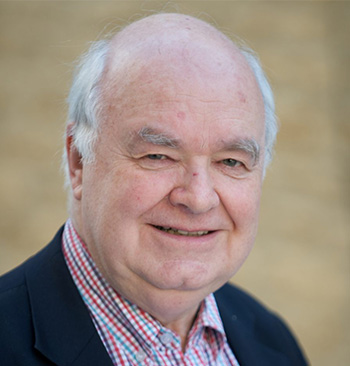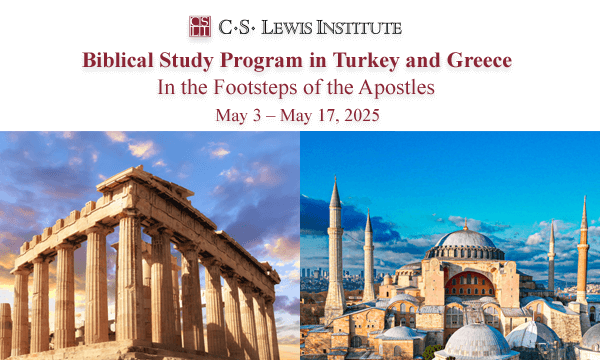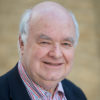Back to series



Intellectually Fulfilling Faith: Lessons from C.S. Lewis
VOLUME 1 NUMBER 3 ISSUE OF BROADCAST TALKS (PDF)
BROADCAST TALKS presents ideas to cultivate Christ-like thinking and living. Each issue features a transcription of a talk presented at an event of The C. S. Lewis Institute. The following is adapted from John Lennox’s keynote address at the C.S. Lewis Institute’s 2016 Fundraising Banquet, entitled Come Further Up and Further In, held at the Fairview Park Marriott in Falls Church, VA on April 14, 2016.
Ladies and Gentlemen, I am greatly honored to be invited to this 40th-year celebration of the C.S. Lewis Institute.
I first met C.S. Lewis’s books through my father who kept copies of Mere Christianity in the glove compartment of his car to give to intelligent hitchhikers, no doubt as their guide, not to the galaxy, but possibly to its meaning and to that of life within it. I devoured these books as a teenager and had read, I think, every one of C.S. Lewis’s books, except the technical works of literature, before I left school in Northern Ireland, which was C.S. Lewis’s birthplace as well. So when I arrived in Cambridge in 1962, I was well aware that Lewis was there. Cambridge, I am glad to say, had been prepared to do what Oxford was not: give Lewis a Chair, which took some doing, of course, since first of all Lewis did not apply for the post, though it was advertised, and secondly, he declined it twice before his friend, Lord of The Rings author J.R.R. Tolkien, engineered his reluctant acceptance. I was not aware in 1962 that Lewis was very ill and so felt that there would be many opportunities to hear him. Yet, he only had a year to live.

The Cambridge University Mathematics Institute was on Bene’t Street, made famous by The Eagle Pub, where Crick and Watson announced their discovery of the structure of DNA in 1953. Just across the road from the Maths Institute were the English faculty lecture rooms, so it was relatively easy, both on one’s conscience and on one’s body, to occasionally slip away from the mathematics lecture to go across the road and sit at the feet of C.S. Lewis. So it was, over fifty years ago now, that I came to listen to the last lectures he ever gave.
Now, I want you to picture the setting: The English faculty lecture rooms, packed to capacity, with students on the windowsills and on the floor, thronging the area even around the lectern, and at the appointed time the double doors burst open and this burly man in an overcoat came in with a thick scarf and a hat – it was a cold winter – and started lecturing immediately as he opened the door. And as he proceeded through the room, he began to unwind his scarf and take off his hat and take off his coat, and by the time he’d done all of that, you’d have five minutes of a scintillating lecture already given to you. The interesting thing was that the lecture ended in similar but reverse fashion. That is, Lewis kept lecturing while he put on his coat and his hat and wound up his scarf, and his last words were uttered as he burst out through the doors into the street. There was no time for Q&A.
Now the subject of those lectures was the poetry of John Donne. Lewis called him the saddest and most uncomfortable of our poets. And yet in spite of this, he wrote in his autobiography: “The key to my books is Donne’s maxim, ‘The heresies that men leave are hated most.’ The things that I assert most vigorously are those that I resisted long and accepted late.” And this may well be one of the keys of Lewis’s intellectual domination of the twentieth century as a Christian apologist. It was because he had resisted atheism long, and so penetrated its force, that he has had a formative influence on the thinking of millions of people, including myself. You see, ladies and gentlemen, like some of you, maybe many of you, I do not know what it is like to be an adult atheist. I had parents who taught me about God, who had the insight, intelligence, and love sufficient to give me space to think, so that when I arrived in Cambridge I was not freighted down with the baggage of Northern Ireland sectarianism. But once I got there, I soon encountered the winds of opposition and in my very first week a student said, “Do you believe in God?” and then he stopped, muttering: “Oh sorry, I forgot, you’re Irish. Of course you do. In Ireland, all you people believe in God and you fight about it.” That was a turning point in my life. I’d heard it before, of course, but I thought: Is my faith in God merely a product of my Irish genetics, heredities, environment, as Sigmund Freud would have suggested? And it was here that Lewis crucially, similarly endowed like myself with Irish genetics, came to the rescue. Because what I needed was a tour guide to atheism. But more than that, I needed someone to guide me who didn’t only know it through books. He knew it from the inside, right up to his middle life. And it was his experience of coming to grips with the arguments of atheism and his crystal clear articulation and refutation of its beliefs that I found and still find deeply instructive.
He arrived to study in Oxford at New College in 1917 and was immediately sent off to war, was seriously wounded in 1918, and invalided out, recommencing his studies in 1919. He was a strong atheist at the time. Firstly, because he had come to believe that science had rendered belief in God untenable. Secondly, an unhappy boyhood and his experience of human tragedy and suffering in the Great War had given him a sense of futility; indeed, of a grim cosmic futility and anger against God that was increased by the fact that God did not exist. Science and suffering then, were for him the barriers as they are the barriers for so many of our contemporaries still today. But as he studied classical philosophy and the great literature of the world, his atheism began to be undermined. He began to suspect that views like Christianity were not necessarily false because they were old, a notion he’d dubbed “chronological snobbery.” He rapidly came to the conclusion that it was the modern world that had gone wrong and needed to get back to the ancient truths of Christianity. Also, the writings of John Donne and George Herbert and other Christian authors began to suggest to Lewis the possibility that Christianity actually made better sense of the world than either atheism or agnosticism. He subsequently wrote that “I believe in Christianity as I believe that the sun has risen not only because I see it but because by it I see everything else.” And it was that conviction and the articulation of it – that Christianity makes sense – that I believe is one of his greatest contributions to the Christian faith. He argued that Christianity is no mere philosophy, nor is it intended to be something to be entered upon as some intellectual, suicidal leap of faith. He insisted there were reasons for believing, that there was a Creator God, the Word who had become human as Jesus the Messiah.
And the importance of this cannot be exaggerated in our time where the new atheists have persuaded many people that faith in God means believing where there is no evidence or grounding in reason.
Lewis’s marshalling of arguments resonates powerfully with the scientist in me even though Lewis was no scientist. He admits, “I could never have gone far in any science because on the path of every science the lion Mathematics lies in wait for you.” Of my own field, algebra, he had this to say, “I read algebra (devil take it!).” He failed the dreaded Responsions exam in 1917. The war then intervened, and he was able to resume his studies after the war when he was exempted from having to re-sit. It’s sobering, isn’t it, to think that lack of mathematical ability nearly kept Lewis out of Oxford, and thereby probably depriving us of one of the intellectual giants of Christian history.
However, he loved geometry, and he made much imaginative use of it. For instance, he writes:
God has a positive structure which we could never have guessed in advance, anymore than a knowledge of squares would have enabled us to guess at the cube. He contains “persons” (three of them) while remaining one God, as a cube contains six squares while remaining one solid body. We cannot comprehend such a structure anymore than the Flatlanders could comprehend a cube. But we can at least comprehend our incomprehension, and see that if there is something beyond personality it ought to be incomprehensible in that sort of way. The Pantheist, on the other hand, though he may say “super-personal” really conceives God in terms of what is sub-personal – as though the Flatlanders thought a cube existed in fewer dimensions than a square.
 The brilliance of such explanations is not so much that they bring us nearer to understanding the doctrine of the Trinity but that they show us that we don’t need to be embarrassed by our incomprehension any more than a Flatlander need be embarrassed for failing to understand the cube.
The brilliance of such explanations is not so much that they bring us nearer to understanding the doctrine of the Trinity but that they show us that we don’t need to be embarrassed by our incomprehension any more than a Flatlander need be embarrassed for failing to understand the cube.
I have fun with my scientific colleagues around the world when I ask them, “What do you do your science with?”, and they often tell me about some very expensive machine and I say, “No, no, no; I don’t mean that, I mean….”
“Oh, you mean my” — and they’re about to say “mind” when they remember that there is no such thing as the mind — and they say “my brain.” (I actually do believe that mind and brain are to be distinguished, but that’s another topic.)
“You mean my brain?”
“Yes, I mean your brain. You do science with your brain. Well, tell me the story of the brain.”
“Well do you want the long story or the short?” I said the short.
“Well, in short, the brain is the end product of a mindless, unguided process.”
And I look at them and smile and I say, “And you trust it?”
If you knew that your computer was the end product of a mindless, unguided process, you wouldn’t trust it for a moment, would you? And yet to do your science, you trust something that you believe has come to be without any mind behind it whatsoever.
It’s interesting to know that one of the first people to raise that question was Darwin himself. It’s called Darwin’s Doubt. He said, “With me the horrid doubt always arises whether the convictions of man’s mind, which has been developed from the mind of the lower animals, are of any value or at all trustworthy. Would any one trust in the convictions of a monkey’s mind, if there are any convictions in such a mind?”
And Lewis got that! Presciently, in the 1940’s, Lewis saw that brilliant science had been done by thinking. But what people had failed to do was think about the thinking. And he says this:
Unless human reasoning is valid no science can be true. It follows that no account of the universe can be true unless that account leaves it possible for our thinking to be a real insight. A theory which explained everything else in the whole universe but which made it impossible to believe that our thinking was valid, would be utterly out of court. For that theory would itself have been reached by thinking, and if thinking is not valid, that theory would, of course, be itself demolished. It would have destroyed its own credentials. It would be an argument which proved that no argument was sound — a proof that there are no such things as proofs — which is nonsense.
And that issue has now moved to the center of the contemporary debate about God and science.
A couple of years ago, the eminent American philosopher Thomas Nagle wrote a book with a very explosively provocative subtitle: Mind and Cosmos – Why the Materialist Neo-Darwinian Conception of Nature is Almost Certainly False. Now, the interesting thing about this is that Nagle is an atheist. “I want atheism to be true,” he writes, “…I don’t want there to be a God; I don’t want the universe to be like that.” Yet, he writes, “consciousness is the most conspicuous obstacle to a comprehensive naturalism that relies only on the resources of physical science. If we take this problem seriously and follow out its implications, it threatens to unravel the entire naturalistic world picture.” That is Lewis exactly! Or again says Nagle, “Evolutionary naturalism implies that we shouldn’t take any of our convictions seriously, including the scientific world picture on which evolutionary naturalism itself depends.”
Another world-class philosopher is Alvin Plantinga, and he sums up the position: “If Dawkins is right, that we are the product of mindless unguided natural processes, then he has given us strong reason to doubt the reliability of human cognitive faculties and therefore inevitably to doubt the validity of any belief that they produce – including Dawkins’ own science and his atheism.”
Naturalism is fatally flawed. It undermines the foundations of the very rationality that is needed to construct or understand or believe in any kind of argument whatsoever, including those that are used to defend naturalism. It therefore doesn’t simply shoot itself in the foot, which is painful; it shoots itself in the brain, which is fatal. A parallel aspect of this fatal flaw that Lewis saw so clearly is that naturalism’s claim to explain everything in terms of the physical sciences overlooks the fact that one of the now fundamental concepts of science – information – cannot be explained in such terms, not even in principle. We live fascinatingly in the information age in which we’ve discovered that DNA is an information-bearing macro molecule. But we’ve realized that information, though itself often carried on material carriers, is itself immaterial. The physical sciences cannot by definition cope with the immaterial, nor can naturalism. In other words, information is not within the explanatory power of physical reductionism and so naturalism fails.
And the Gospel of John gets that exactly when it says, “In the beginning was the Word. The Word already was. The Word is eternal.” That is an existent statement. And then it says, “All things” – not were made by Him (although that is true) – It’s, “All things were made through Him and without Him nothing came to be that came be.” That’s an existent statement. Mind the Word is primary, the physics and chemistry are derivative. It’s the Word before everything else. And Lewis saw that and made massive contributions to getting it across. Christianity for him was a completed, coherent of explanation of why the world is actually in part scientifically intelligible, and why immaterial information exists because ultimately responsible for our universe is an immaterial, Creator God, and He is also responsible for the creation of the human mind in his image.
And that’s why science works. And he summed it up brilliantly as usual: “Men became scientific,” he said, commenting on the explosion of modern science in the 17th century, “Men became scientific because they expected Law in Nature, and they expected Law in Nature because they believed in a Legistlator.” And so for Lewis, who is described as a thoroughgoing super naturalist, super nature did not start with the miracles recorded in Scripture. It started with human reason itself. That in every human being there’s an outpost witnessing to the fact that nature is not all that exists, and that, to my mind, is an increasingly powerful tool for reaching our contemporary generation. Dawkins crusades against all super natural gods. Lewis gives us the way in, starting with the nature of human reason and using that as a bridge into the nature of God Himself.
Of course Lewis didn’t only deconstruct atheism; he helps us to see positively that central to Christianity is the conviction that this world is not the only world in existence. There is another world, if anything, more real than this one. And there is a door between the two worlds. Lewis used his brilliant creative imagination to paint word pictures that enable us to get through that door and comprehend things that go way beyond us. He did with language and words what musicians do with music. Transposition: using one key to explain something in another key; using the simpler to explain the more difficult, and in the much loved Narnia novels, Lewis did this masterfully. He did not regard Narnia as an imaginary world that has no counterpart in reality, but an imaginative world – something produced by the human mind as it grapples with the reality that’s bigger than itself. To use Lewis’s imagery, Narnia can be looked at as a spectacle, something to be enjoyed in its own right. Or, as a pair of spectacles, through which we could look in order to see the Christian faith illuminated from different angles, to see its coherence, and its sense as well as to demolish the arguments of its opponents.
Lewis had such a magnificent power of evocation so that when you listen to his description you sense a tingling and a thrill of sheer wonder as he strives to make the eternal world real. “All the leaves of the New Testament,” he wrote, “are rustling with” intimations of eternity. And, ladies and gentlemen, if ever we’re to win this generation, we’ve got to grasp that by experience. And we need to ask ourselves: Why do we study Scripture? And so often, for people engaged in Christian activities, their study is mainly focused on getting stuff for other people. That’s wonderful. Keep doing it. But there is a deeper and much more important thing. We read Scripture, don’t we, to get to know God, ladies and gentlemen. And to read Scripture and wait on God until we sense that rustling of the intimation of eternity – that changes people.
I had to bury my best friend a couple of years ago. And I asked him (he was much younger than I was, a distinguished evangelist who’d led thousands of students to Christ), “What shall I tell them?”
“Oh,” he said, “tell them to do what we did when we were students at Cambridge. Tell them to get into Scripture and give it the same devotedness as they do to professional work and get into Scripture and wait on God UNTIL THE FACE OF GOD APPEARS!” And then he added, “And then they will have something to say.”
Do you want to have something to say? I want us to have something to say. And in the end when we’ve mastered all the arguments — and they’re important — but we need to say something that’s got an eternal quality to it. And the only way of doing that, that I know of, is by spending time – and it’s easy to work out how much time we’ve got. All we have to do is measure how much time we spend watching a screen that’s got nothing to do with our own work, and then to spend that time getting to know God and His Word.
 And so to conclude, the reality of that world was Lewis’s central hope: “If I find in myself a desire which no experience in this world can satisfy, the most probable explanation is that I was made for another world.” And as we look around our world, it often seems we’re living in a world like Narnia once was, in which it was always winter, never Christmas. Yet there is another glorious world, ladies and gentlemen, and evidence of it is within this world’s history and experience. As Queen Lucy herself said: “Yes, in our world too, a Stable once had something inside it that was bigger than our whole world.” And when Lucy and Edmund had to return to this world, they feared being separated from Aslan, and Lucy said, “We shan’t meet you there. And how can we live never meeting you?”
And so to conclude, the reality of that world was Lewis’s central hope: “If I find in myself a desire which no experience in this world can satisfy, the most probable explanation is that I was made for another world.” And as we look around our world, it often seems we’re living in a world like Narnia once was, in which it was always winter, never Christmas. Yet there is another glorious world, ladies and gentlemen, and evidence of it is within this world’s history and experience. As Queen Lucy herself said: “Yes, in our world too, a Stable once had something inside it that was bigger than our whole world.” And when Lucy and Edmund had to return to this world, they feared being separated from Aslan, and Lucy said, “We shan’t meet you there. And how can we live never meeting you?”
“But you shall meet me, dear one,” said Aslan.
“Are – are you there too, Sir?” said Edmund.
“I am,” said Aslan. “But there I have another name. You must learn to know me by that name. This was the very reason why you were brought to Narnia, that by knowing me here for a little, you may know me better there.”
Richard Dawkins once wrote that Darwin had helped him to become an intellectually fulfilled atheist. Ladies and gentlemen, C.S. Lewis has helped me and thousands of others to become an intellectually fulfilled Christian. The C.S. Lewis Institute exists to help many others do the same. That is why it is vitally important that you support it. Thank you very much.

John Lennox
ProfessorDr. John C. Lennox is an Irish mathematician, bioethicist, and Christian apologist. Now retired, he is the Emeritus Professor of Mathematics at the University of Oxford as well as the Emeritus Fellow in Mathematics and Philosophy of Science at Green Templeton College, Oxford. He has also been a part of public debates with New Atheists such as Richard Dawkins, presenting intellectual defenses of Christianity. Lennox has written acclaimed books such as Cosmic Chemistry: Do God and Science Mix?, 2084: Artificial Intelligence and the Future of Humanity, and most recently A Good Return: Biblical Principles for Work<, Wealth and Wisdom. He received his Ph.D. of Philosophy at the University of Cambridge, while also holding numerous honorary degrees from other British universities.

 COPYRIGHT: This publication is published by C.S. Lewis Institute; 8001 Braddock Road, Suite 301; Springfield, VA 22151. Portions of the publication may be reproduced for noncommercial, local church or ministry use without prior permission. Electronic copies of the PDF files may be duplicated and transmitted via e-mail for personal and church use. Articles may not be modified without prior written permission of the Institute. For questions, contact the Institute: 703.914.5602 or email us.
COPYRIGHT: This publication is published by C.S. Lewis Institute; 8001 Braddock Road, Suite 301; Springfield, VA 22151. Portions of the publication may be reproduced for noncommercial, local church or ministry use without prior permission. Electronic copies of the PDF files may be duplicated and transmitted via e-mail for personal and church use. Articles may not be modified without prior written permission of the Institute. For questions, contact the Institute: 703.914.5602 or email us.
-
Recent Podcasts
A Welcome Change in Apologetics
by Randy Newman on April 18, 2025Apologetics has for a long time, been motivated...Read More
-
Resisting God – Dr. John W. Taylor’s Story
by Jana Harmon, John Taylor on April 11, 2025
-
The Defiance of Grace in the Ministry of Christ
by Dane Ortlund, Aimee Riegert on April 4, 2025
-
Recent Publications
Who Is The Real Jesus?
by John R.W. Stott on April 1, 2025The 21st century has provoked many conversations and...Read More
-
Does the Modern World Face a Crisis of Meaning?
by Cameron McAllister on March 1, 2025
-
The Impact of Technology on the Christian Life
by Tony Reinke on February 14, 2025
0
All Booked
0.00
All Booked
0.00
All Booked
18008
GLOBAL EVENT: 2025 Turkey & Greece Study Program – In the Footsteps of the Apostles
https://www.cslewisinstitute.org/?event=global-event-2023-biblical-study-program-of-israel&event_date=2025-05-03®=1
https://www.paypal.com/cgi-bin/webscr
2025-05-03

Next coming event
Days
Hours
Minutes
Seconds
GLOBAL EVENT: 2025 Turkey & Greece Study Program – In the Footsteps of the Apostles
On May 3, 2025 at 3:00 pmat İstanbul, TürkiyeSpeakers

John Lennox
Professor
Team Members

John Lennox
ProfessorDr. John C. Lennox is an Irish mathematician, bioethicist, and Christian apologist. Now retired, he is the Emeritus Professor of Mathematics at the University of Oxford as well as the Emeritus Fellow in Mathematics and Philosophy of Science at Green Templeton College, Oxford. He has also been a part of public debates with New Atheists such as Richard Dawkins, presenting intellectual defenses of Christianity. Lennox has written acclaimed books such as Cosmic Chemistry: Do God and Science Mix?, 2084: Artificial Intelligence and the Future of Humanity, and most recently A Good Return: Biblical Principles for Work<, Wealth and Wisdom. He received his Ph.D. of Philosophy at the University of Cambridge, while also holding numerous honorary degrees from other British universities.





